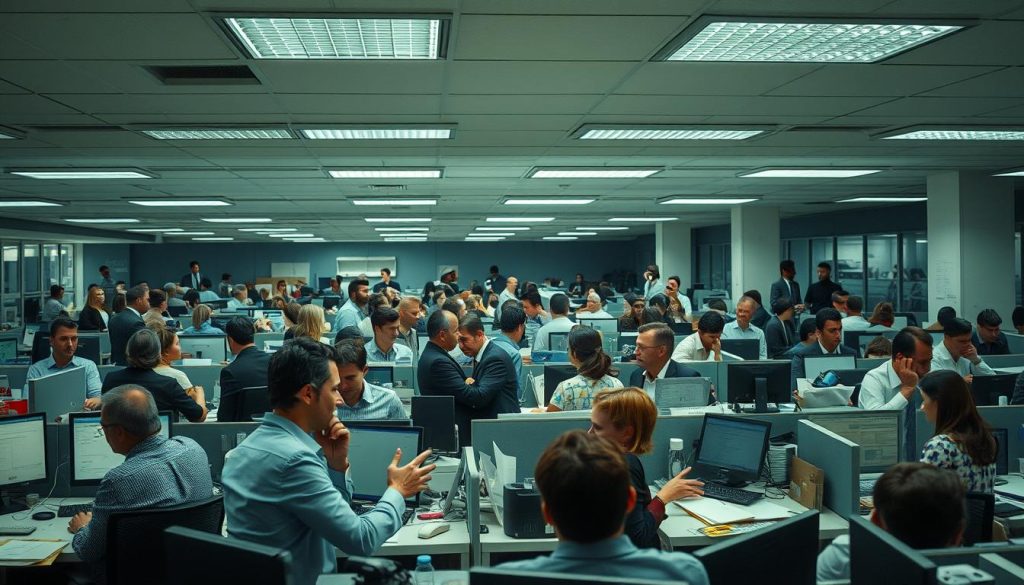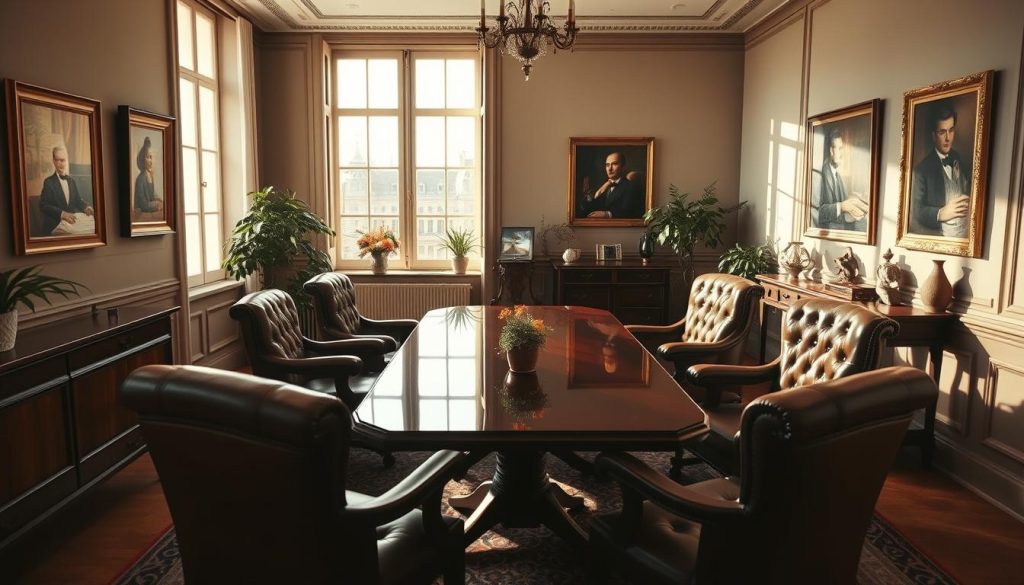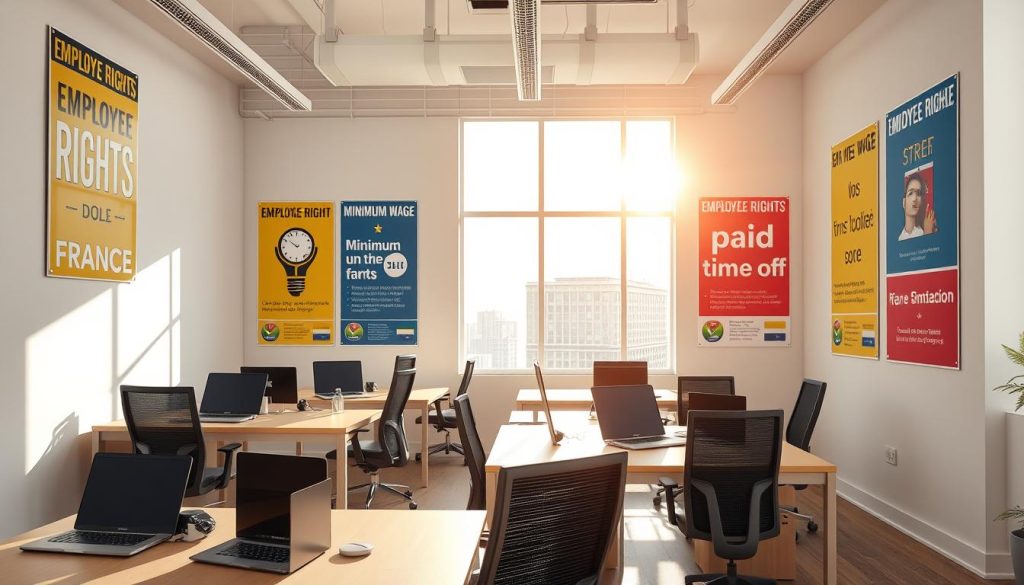The work culture in France is complex, mixing old traditions with new ideas. It values social connections, respect for those in charge, and a fair work-life balance. To succeed in France, it’s key to understand these work ethics.
This includes how people interact at work and the laws that shape these interactions. Exploring these areas helps us grasp the nuances of working in France.
Overview of Work Culture in France
The work culture in France is a mix of tradition and change. It shows the special qualities of French work life. The French value formality and respect for those in charge. They also believe in balancing work and personal life, making employees happy and productive.
Key Characteristics
Some key traits of French work culture include:
- A strong focus on hierarchical structures, where roles and responsibilities are clearly defined.
- Formality in communication, promoting professionalism and respect during interactions.
- A cultural insistence on work-life balance, where personal time is highly valued.
- Collaboration and teamwork, which are essential for fostering a conducive work environment.
Historical Influences
The French Revolution had a big impact on work culture. It led to changes that shaped modern work traditions. Industrialisation then brought in labour laws that protect workers. This mix created a culture that values both individual effort and teamwork.
Importance of Work-Life Balance
In France, work-life balance is seen as key to the work culture. It’s backed by rules on working hours and lots of holiday time. These help keep employees happy and productive.
Work Hours and Flexibility
French law says you can’t work more than 35 hours a week. This helps people balance work and life. Many companies also offer flexible work, so you can fit your job around your life.
Holidays and Leave
French workers get about five weeks of paid holiday and many public holidays. This lets them rest and enjoy things outside work. It shows how important it is to have a good balance between work and play.

Hierarchy in French Workplaces
The workplace hierarchy in France is clear and affects daily life. Management roles are key, guiding teams and making big decisions. Knowing this hierarchy helps teams work well together and keeps the workplace calm.
Role of Management
In France, management has a lot of power and duty. They plan, teach, and support their teams. Their job includes:
- Setting goals for the organisation
- Helping make decisions
- Creating rules that match the company’s values
- Checking how well the team is doing and giving feedback
Management shapes the work culture by showing what the company stands for. This clear authority earns respect from employees. It makes the team work better together.
Authority and Decision-Making
In French workplaces, decisions usually come from the top. While employees’ opinions are important, the final say goes to the bosses. This shows respect for those with more experience and knowledge.
Here is a table showing who has what authority in French companies:
| Level | Description | Decision-Making Power |
|---|---|---|
| Top Management | CEO and senior executives | Sets strategic direction and key policies |
| Middle Management | Department heads and managers | Implements strategies and manages teams |
| Team Leaders | Leads small project or task teams | More operational decision-making |
| Employees | All other staff members | Contribution to discussions and feedback |
This focus on hierarchy makes communication clear and responsibilities clear. It might seem strict, but it helps managers make good decisions quickly.
Communication Styles
In French workplaces, we see a mix of direct and indirect communication. This mix affects how we share our ideas and understand others. Direct communication is clear and efficient, but indirect communication is key in social settings.
Direct vs. Indirect Communication
Direct communication is all about being straightforward. It’s great for clear talks in French workplaces. But, indirect communication is also important, mainly in casual chats or networking. It lets us share more subtly, leading to agreements without always saying it out loud.
The Role of Formality
In France, being formal is very important. It shapes how we greet each other and write emails. This formality helps create a respectful work environment. It’s a big part of French work culture and affects how we communicate.

| Aspect | Direct Communication | Indirect Communication |
|---|---|---|
| Definition | Straightforward and clear messaging | Subtle, nuanced expressions of intent |
| Usage | Formal meetings, negotiations | Casual conversations, social settings |
| Outcome | Immediate clarity in understanding | Building relationships through implied meaning |
| Examples | Directly stating needs or opinions | Using suggestions or hints to convey thoughts |
Dress Code and Professional Appearance
Knowing the dress code in France helps you understand what’s expected in the workplace. The French love fashion, and this shows in their business attire. Looking polished shows you’re professional and respectful to your colleagues and work space.
Business Attire Norms
In France, traditional business clothes are common. Men wear tailored suits, ties, and shiny shoes. Women choose elegant dresses or skirts with blouses and smart shoes. It’s all about quality and fitting well, showing you’re sophisticated.
Casual Fridays and Dress Down Policies
Now, there’s more flexibility in French work clothes, like on Casual Fridays. This lets people wear smart-casual clothes. But, it’s important to keep your outfit professional, fitting the work setting.
It’s all about finding the right balance between style and professionalism in France. Following these rules can make a good impression and help you build strong work relationships.
The French Approach to Meetings
In France, meetings have a unique structure and a big focus on being on time. Knowing these aspects is key for working well together in a French workplace.
Structure and Punctuality
Meetings in France are well-organised, giving everyone a chance to share their thoughts. Being on time is more than just a nice gesture; it’s a sign of respect. It shows you value your colleagues and the meeting’s goals.
Sticking to this rule helps create a disciplined and efficient work environment.
Agenda and Participation
A clear agenda is essential in French meetings. It lists what will be discussed, guiding the meeting. This keeps the conversation on track and helps everyone prepare.
Everyone is also expected to share their ideas. This way, different views are heard, making decisions better and teamwork stronger.

Navigating Professional Relationships
Building professional relationships in France is key to success. The French workplace values personal connections. These connections help in career growth and teamwork.
Creating trust and rapport takes time and effort. It’s about real interactions and genuine connections.
Building Trust and Rapport
Trust is vital in French professional relationships. We must be sincere with our colleagues, showing respect and understanding. Here are some tips:
- Listen actively to show we care.
- Be consistent and reliable in our communication.
- Always be honest to keep our integrity.
By focusing on these, we build strong connections. These are essential in the French business world.
Networking Opportunities
Networking in France can boost our careers. Personal and professional relationships go hand in hand. To grow our network, we should:
- Go to industry events and seminars.
- Join local business gatherings.
- Use online platforms to connect with more people.
These steps not only expand our professional circle. They also help us feel part of the French business community.
| Relationship Building Strategy | Benefit |
|---|---|
| Active Listening | Demonstrates respect and fosters engagement |
| Reliable Communication | Builds trust and conveys professionalism |
| Honesty | Strengthens credibility and long-term partnerships |
| Industry Events | Expands professional connections and insights |
| Online Platforms | Offers broader networking possibilities |
Employee Rights and Protections
In France, employee rights are well-protected. This ensures fair treatment at work. We look at the key labour laws that protect these rights. These laws help create a fair work environment, giving workers many benefits and fair treatment.
Labour Laws in France
French labour laws are key to protecting workers. They cover important areas like:
- Working hours, which limit the workweek to 35 hours.
- Parental leave, allowing both parents to care for newborns.
- Health and safety, ensuring safe workplaces.
These laws are vital. They define the relationship between employers and employees. They prevent exploitation and improve job security.
Trade Unions and Workers’ Rights
Trade unions are big in France. They fight for workers’ rights. They play a big role in:
- Negotiating better wages and working conditions.
- Helping employees with disputes against employers.
- Making sure labour laws are followed.
By joining trade unions, workers have a stronger voice. They can influence negotiations and push for fair treatment in French workplaces.

The Role of Teamwork
Teamwork in France is key to creating effective work places. It combines teamwork with individual effort, creating a special work environment. This balance is vital for success in any team.
Collaboration vs. Individualism
In French workplaces, teamwork boosts productivity. It brings together different views and skills, leading to new ideas. At the same time, individual effort is valued, allowing for personal growth and responsibility.
This mix helps team members do well together and reach their personal goals.
Team Dynamics and Performance
Good team dynamics are essential for success. French teams focus on open communication and respect, building strong trust and cooperation. Strategies like regular feedback, team activities, and clear roles help a lot.
When team members know their strengths and how they help the team, the work place becomes more lively and productive.
Influence of French Culture on Work
The French culture in workplaces is woven with cultural values that shape work environments. Principles like liberté, égalité, and fraternité are more than just words. They guide how people work together and influence policies. These values help us understand the French work culture better.
French Values in the Workplace
French values balance individual rights with collective duties. This creates a strong sense of community among colleagues. Employees have freedom, showing the importance of liberté. Yet, they also support each other, showing the value of égalité and fraternité.
This mix of values makes workplaces where teamwork is key. It lets employees share ideas freely with each other.
Impact of Arts and Philosophy
The arts and philosophy in French workplaces do more than add beauty. France’s history of thinkers and artists promotes creativity and thinking. This leads to a workplace where new ideas are welcomed and old ones questioned.
Open discussions and sharing ideas are common. This makes the workplace lively and open to different views.
Professional Development and Training
In France, professional growth is key for everyone. Companies push for ongoing learning to stay ahead. They offer many chances to improve skills and knowledge needed in the job market.
Continuous Learning
France values lifelong learning in the workplace. Many firms run training on various subjects. This helps both personal and team growth, making everyone more skilled.
Mentorship Opportunities
Mentorship is big in France’s work culture. It pairs experienced workers with newcomers. This helps in sharing knowledge and building career paths. It’s a way to grow both personally and professionally.
Challenges in French Work Culture
Exploring the French work culture can be tricky. We often face cultural misunderstandings that affect teamwork and clear communication. It’s key for both expats and locals to understand these issues to succeed in this unique setting.
Cultural Misunderstandings
Cultural differences can cause problems in the French workplace. For example, communication styles, views on hierarchy, and time management can lead to issues. The French might prefer a more subtle approach to communication, which can be confusing.
It’s important to be open to learning and adjusting in these situations. This way, we can avoid misunderstandings and improve our interactions.
Managing Diversity in the Workplace
Workplace diversity brings many benefits, like new ideas and creativity. To make the most of it, we need to focus on inclusivity. Setting up training on cultural awareness is a good start.
These programs could include activities that celebrate different cultures. This helps everyone feel important and valued. Such efforts can boost teamwork and benefit the company as a whole.
Conclusion
Understanding and embracing French work culture is key for success in France. The focus on work-life balance and formal communication is important. These aspects shape the workplace in France.
By adapting to this culture, we build stronger relationships with colleagues. This leads to better productivity and job satisfaction.
Embracing France’s Work Culture
To fit in with French workplaces, we must respect cultural differences. This means changing how we communicate and understanding the role of meetings. Wearing the right clothes is also important.
By doing this, we improve our interactions and grow professionally. It makes our work environment better for everyone.
Final Thoughts on Adaptation and Integration
Successfully adapting to French work culture takes effort and openness. We must be ready to learn and respect the values of teamwork and professional relationships. This makes our integration smooth and valuable.
Embracing cultural differences benefits our careers and the workplace. It creates a place where everyone can work well together and innovate.







